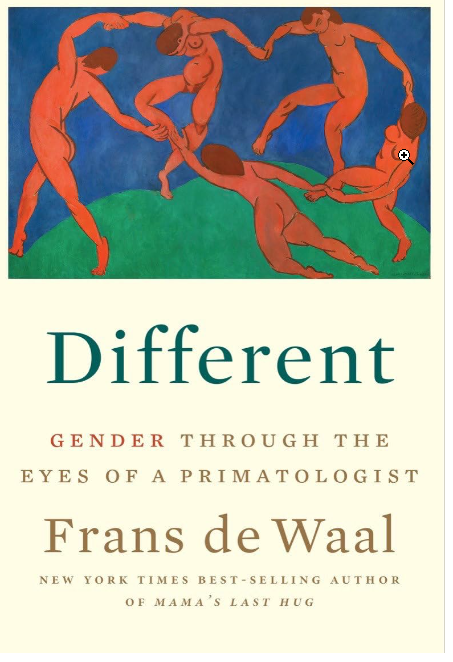Last spring, I retired from staff service with a local community organization, Quadra Village Community Centre. Although the advocacy service I provided over the years was focused on seniors, the Centre offered extensive programming for early childhood, youth, and families. Often, staff team conversations touched on gender. Gaining fluency in terminology that was natural to younger staff posed an ongoing challenge for me.
Frans de Waal in his 2022 (and last) book, Different, created a table (see below) of Common vocabulary in relation to human sex and gender. The table is a handy reference for those of us not fluent in today’s sex and gender terminology.
(De Waal was one of the world’s leading primatologists. His speciality was the study of bonobos and chimpanzee behaviour. I had read earlier works from de Waal. Sadly, de Waal passed away earlier this year, at the age of 75. Neuroscientist Peggy Mason posted a beautiful tribute to de Waal on her blog.)
Common vocabulary in relation to human sex and gender
| Terminology | Definition |
| Sex | The biological sex of a person based on genital anatomy and sex chromosomes (XX for female, XY for male). * |
| Gender | The culturally circumscribed role and position of each sex in society. ** |
| Gender role | The typical behaviour, attitudes, and social function of each sex resulting from an interplay between nature and nurture. |
| Gender identity | A person’s inner sense of being either male or female |
| Transgender | Referring to a person whose gender identity does not match their biological sex. *** |
| Transsexual | Referring to a person who has undergone hormonal and/or surgical gender reassignment; a medical term. |
| Intersex | Referring to a person whose sex is ambiguous or intermediate since their anatomy, chromosomes, and/or hormonal profile doesn’t fit the male/female binary. |
* This is the medical definition of human sex. In biology, sex is defined by the size by the size of gametes (such as sperm and eggs), with females having the larger gametes.
** In the United States, the term gender is increasingly used for biological sex, including even that of animals, which is not its original meaning.
*** When gender and biological sex agree, the person is said to be cisgender.
Further on gender, from de Waal
- In the ape world, social dominance also includes generosity (not just about being a bully).
- Our gender radar is always on – our social software was written millions of years ago. For men, this means keeping an eye on their fellows.
- We (humans) should marry the anthropological view of brotherhood with the psychological view of sisterhood. Both are plain to see and powerful.
- Conciliatory possibilities – if conciliatory tendences are shaped by biological evolution, (de Waal asks us to) think of the additional possibilities open to cultural evolution. We are the only hominid with a balance between male and female bonding and are the most culturally flexible to boot.
- While our civilization values intellect, education, and experience, we still fall for crude body parameters that have no bearing on these qualities. We look down on the brute force we believe underpins the natural order, proud to have left “might is right” behind, yet we remain stubbornly sensitive to our specie’s sexual dimorphism in height, muscularity, and voice. Turning this situation around will require more than a gender timer and few new debate rules. a good start would be to appreciate the evolutionary roots of these biases.
- Human social organization is characterized by the unique combination of 1) male bonding, 2) female bonding, and 3) nuclear families. We share the first with chimps, the second with bonobos, and the third is ours.
- 2 layers of empathy – emotional empathy relies on reading body language (the oldest) level of empathy. Our more cognitive-oriented empathy sits on top of the emotional.
- Grandmother hypothesis – the reason why evolution gave us menopause is that as a reproductive strategy its the best way for older women to advance their genetic legacy is to help their daughters raise children
- “Nature loves variety. Unfortunately, society hates it”. (de Waal quoting Milton Diamond)
- Motivation is hidden – motivation behind behaviour rarely includes the goals for which it evolved. For example, reproduction is the evolutionary goal of nurturance, yet it typically isn’t part of its motivation
- Trouble with dualism – the more radical the notion of gender as a social construct, the less room remains for the body
- Move away from body-mind dualism – its out of touch with everything we have learned from modern psychology and neuroscience. The body, which includes the brain, is central to who are what we are. By running away from our bodies, we only run away from ourselves.
Thank you, Frans.


Speak Your Mind